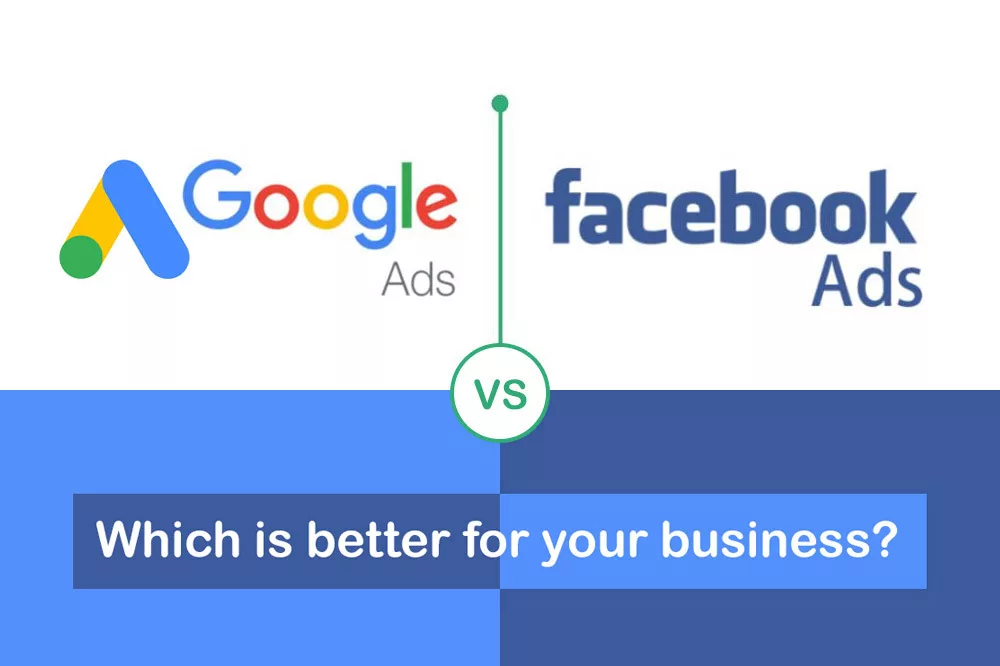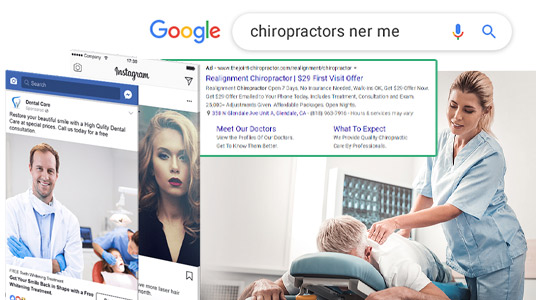Wondering if running ads on Google will work out for your business, or will it be Facebook? Don’t worry, you’re not the only one! In fact, Google ads vs Facebook ads is one of the top searched terms when it comes to marketing. Read our descriptive comparison and assessment of both Facebook and Google Ads to check which one of the two fits your needs better depending on the cost, conversion, approach and ROI.
If we are talking about advertising, Facebook and Google are the big dogs of the digital advertising and marketing universe. While one is a social media site and the other is a search engine, both of these platforms boast billions of users. Since both Facebook and Google have excellent audience densities and targeting abilities, it can be confusing to decide which one of the two is a better fit for your business when you can afford to choose only one to advertise on.
If you think we have one answer that solves all your problems, think again.
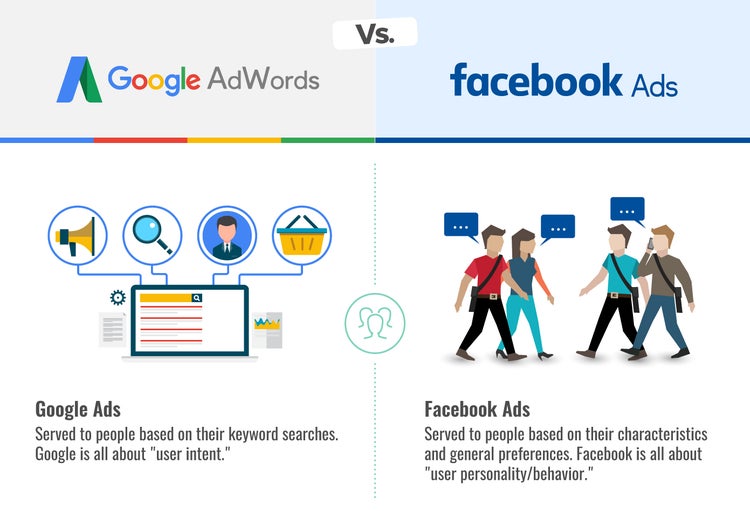
So, instead of telling you which one of the two is the best, our approach on this article will be to help you weigh your options and decide for yourself because you know your business better.
The research done is based on the opinion of marketers and what their experience with Facebook and Google Ads has taught them. They considered factors such as the budget, as well as technical aspects and features of each platform.
Before we jump into the details, do you know how Google and Facebook Ads help your business grow?
This is what both platforms have to offer to your organization in terms of online advertising.
- Building a reputation for your brand.
- Expanding the reach of your information to different audience groups.
- Influences buyer behavior.
- Keeps nudging curious customers as a reminder.
- Repeats ads to increase sales and repeat purchases.
- Provides a gateway to multiple purchasing routes.
Now that you know what online advertising does for your business, it is important to understand both of your options personally. Our articles are for everyone, so let’s start from scratch. What use is a comparison article if it does not introduce you to the contenders?
An Introduction To Facebook Ads
Facebook is the world’s largest social media platform you can’t ignore, boasting over 2.5 billion users active monthly and 1.66 billion daily users.
Though the sheer number of people using Facebook seems staggering, why do people use this platform in the first place? This is not the place to look for a florist or an electrician, but a social network meant for them to connect with long lost contacts. They can keep up with their friend’s lives and be a part of groups that share their hobbies, values, or political inclinations.
Facebook users love to share, be it pictures of their latest vacation, of their family, or material possessions, thereby creating a space to let their friends walk alongside their journey no matter where in the world they might be situated.
Facebook makes the world shrink in size by having effective digital communication.
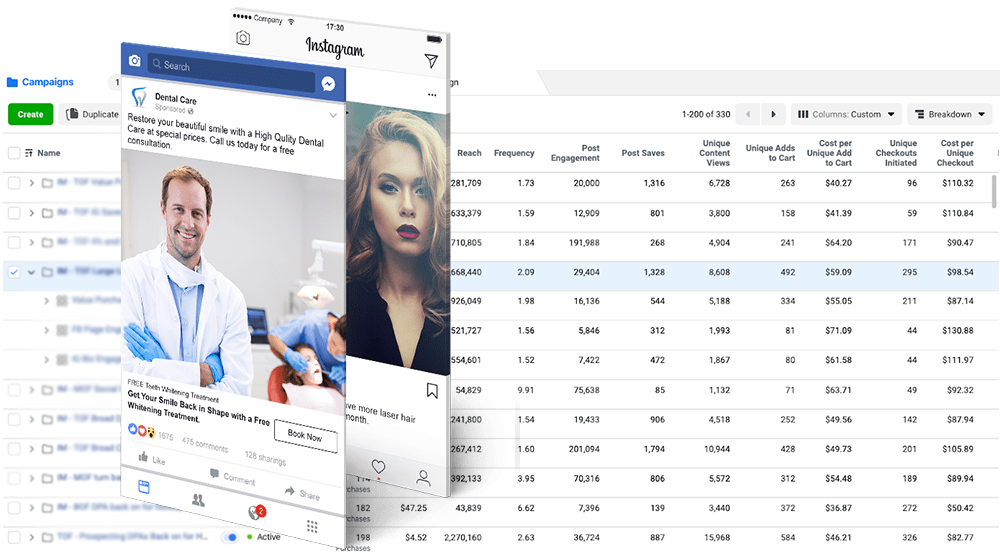
Today, Facebook is also used by businesses of all niche markets to reach out to their intended potential customers. So far, it has been working given the increase in the number of local brand searches. However, the intention to make a purchase is not as high as found on Google Ads.
Facebook Ads are displayed on the newsfeed of the users’ desktop, mobile, app, messenger, and even Instagram to blend seamlessly and look like a regular post. You can also find spaces for advertising on the sidebar with banners and video ads on the newsfeed. Marketer use Facebook Ads in the following manner:
- Creating
brand awareness by boosting likes on your business’ page. - Creating
and posting lead generating ads. - Driving
more audiences to check out your blogs and boost audience engagement on your
website. - Increasing
your sales and influencing audiences to visit your stores. - Increasing
audience views and likes on a video. - Targeting
users on Instagram by using Facebook Ads.
Even though Facebook Ads are a great way to target potential customers through a variety of options, they are not as branched out as Google Ads.
However, Facebook Ads have a weapon that has an invaluable contribution to a brand’s search for the right audience. The detailed targeting feature on Facebook Ads allows a business to find and compile their pool of potential customers by finding them through a job description, hobbies, their favorite cartoons or music bands, among hundreds of similar metrics.
If your customer has shown interest in a specific topic, product, service, movie, brand, or most other details, you’re able to create an audience from that.
This allows a business to become as precise as possible as to who sees their ads. You can also retarget to the people who have already visited your website by using the “Custom Audiences” feature which is a game-changer.
Why Use Facebook Ads?
Facebook advertising is right for just about for any business because of the following reasons:
- Almost every business, employee, and individual has an active Facebook account.
- Your customers spend HOURS A DAY scrolling through their Facebook and Instagram feeds.
- The minimum ad spend on Facebook Ads is just $1 a day, which makes it an affordable channel to use. With less than $50 spent in a month, a business can showcase their business to many potential customers.
An Introduction To Google Ads
Google is the unquestioned champion of search engines, being the largest in the world. It makes up more than 75 percent of the world’s search engine market, making Yahoo, Bing, and the others look like distant relatives due to its data collection.
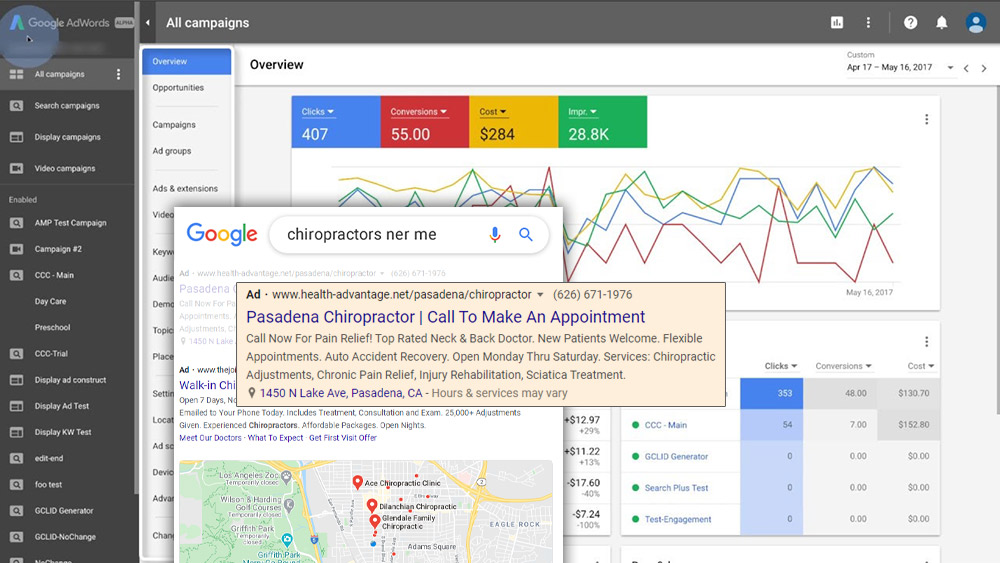
On average, there are about 5.6 billion searches done on Google by users so far in 2020. This is what gives Google the crown in marketing and analytics tools: it has the largest number of eyeballs, i.e. audience to work with when it comes to advertising.
Any business can have a field day using Google Adwords for advertising as it consists of a vast pool of audience for every kind of product and service! What’s even better? You stand a chance to create a new pool of audiences by creating a demand for a product or service that didn’t exist before!
This is how Google Ads is used by marketers to advertise their brands to audiences:
- Search Network: Google Search Network displays advertisements based on keywords, such as “florists near me” by putting the search results at the top of the page.
- Display Network: Google Display Network is meant to showcase your advertisements in the form of images, banners, videos, and more on apps and sites when your keywords are a match or similar to the website or app’s content.
- Google Shopping: Google Shopping Ads are based on the concept of e-commerce, which displays your brand when a product is searched with the intent to purchase.
- Google Videos: Video advertisements are a handy tool for streaming platforms such as YouTube and the Display Network.
- Google Ads Retargeting: Retargeting enables you to remarket your product or service to a customer that has visited your site but may not have converted.
Who needs Google Ads?
Google Ads is your go-to if you’re trying to drive the audience towards conversion. For instance, when a user types out “florists near me” on the search bar, they are bound to click on the first few links that appear right at the top. This is because the keyword itself shows the intent to purchase quickly.
Google Ads is focused on the middle and bottom sections of a sales funnel, but it also is an expert when it comes to brand awareness and post-sales customer support with the help of Google Display Network and YouTube Ads. Apart from conversion, Google Ads is a handy tool at branding that rivals with Facebook Ads.
The main difference between Google and Facebook is that when a user goes to Google to search for a product or service, they are actively looking for what you offer. Whereas Facebook ads are more like solicitation.
Comparing Facebook Ads With Google Ads:
The following information compiles all of our findings between two of the top digital advertising tech companies, Facebook and Google. The table below notes the differences at a glance that will definitely make it easier for you to decide what to use for your business.
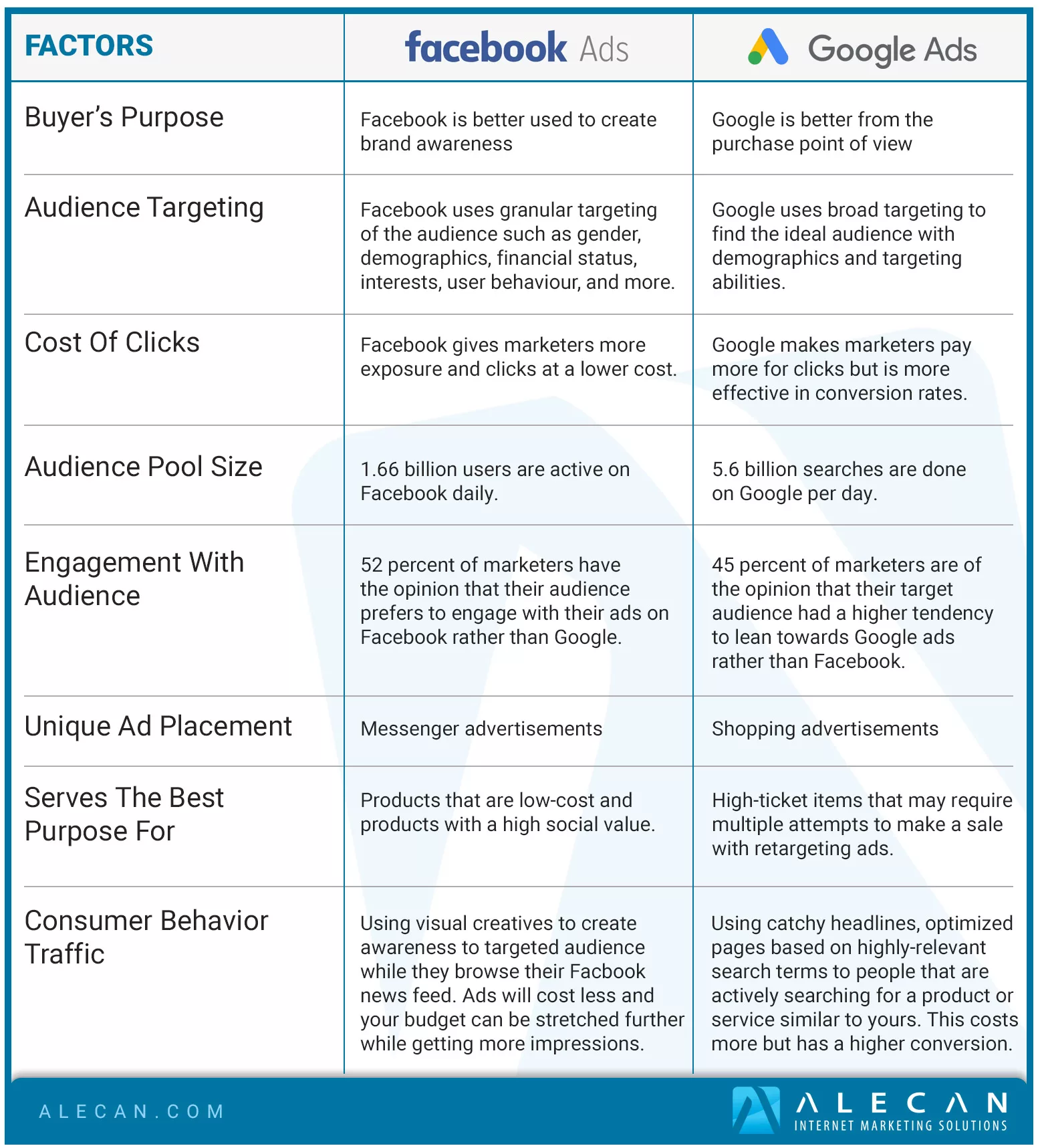
Read on below as we dive into a detailed description of all the factors taken into consideration to compare Facebook Ads Vs Google Ads for your business.
Facebook Ads Vs Google Ads: Buyer’s Purpose
During our research, many of the marketers we asked stressed on taking into consideration the level of the funnel while running Facebook or Google Ads. This is what they had to say.
Facebook Ads Is A Better Tool To Create Brand Awareness
Due to the detailed data about its users that Facebook possesses, businesses stand a better chance at having their pick of an incredibly customized target audience already interested in their niche.
It is also a great channel to make users aware of products and services they think they need. Facebook also is the best channel to promote an upcoming event by putting the message across for users who are inclined to attend. It is also an effective way to retarget your product to ensure a sale in case someone visited your product page and changed their mind.
Google Ads Is A Better Tool For A Purchasing Mindset
Google Ads is the go-to for most marketers working on the bottom funnel. Google’s search engine has the power to attract and direct traffic of people who are searching with the mindset to make an immediate purchase. Such users already know what they want, which makes them easier to target.
Facebook Ads Vs Google Ads: Audience Targeting
Efficient targeting goes hand in hand with searching for the right audience. While this can be done based on the level of the sales funnel the audience belongs in, a business can also use different factors to do the same.
Facebook Ads takes a Granular Targeting Approach
Facebook has the upper hand in terms of targeting an audience due to the detailed targeting, custom audience and lookalike audience features. You’re bound to get more concentrated and refined users based on the most number of matches with the filters you create. These user can be targeted based on demographics, behaviors, interests, and hobbies.
Google Ads Make A Better Option For Those Who Don’t Know Their Audience
If you don’t really know which audience is ideal for your business, Facebook Ads won’t be of much help. At such times, Google Ads is your business’ solution. It gives you a way to discover your potential customers who would most likely purchase your products and services. This is done by targeting keywords put into the search engine to give direct results.
Facebook Vs Google Ads Cost Of Clicks
How much you spend every time someone clicks on your advertisement matters a lot. Since the amount may quickly multiply into a huge sum, paying attention to which one of the two brings more results per dollar spent.
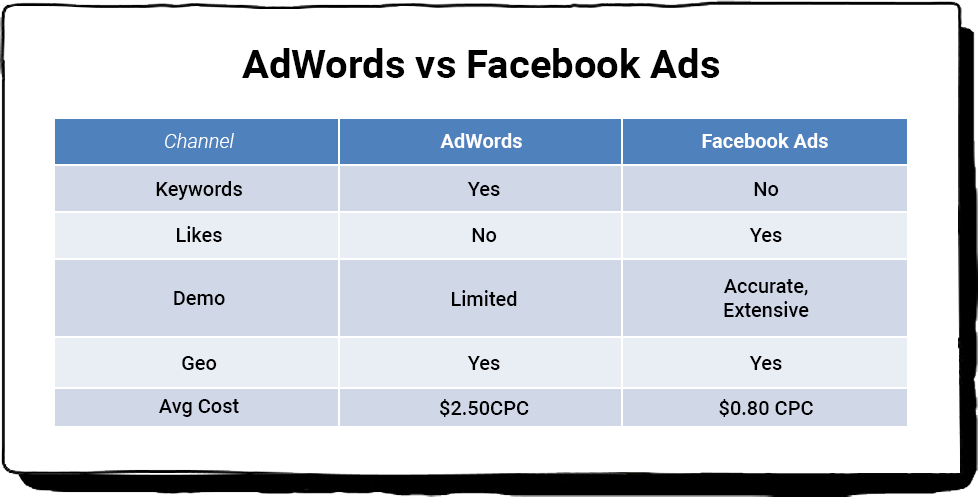
Facebook Ads Is More Cost-Efficient
An average of $10 can get you a lot more impressions, likes, views, comments, amplification, and engagement on your website using Facebook ads.
However, Google Ads may only get you one to two clicks on your website using the keywords you have bid on. It is important to know, however, that visitors coming in from Google searches are more likely to convert into customers.
Google Ads Are Better At Conversions
If you’re dead set on increasing your conversion rate, Google Ads is a better choice for your money. Even though the pay per click may be around $2 for a marketer, the customers have more intent to purchase. This means that spending $10 on 4-5 clicks on average will still give you a lot more visitors who will instantly convert.
Facebook And Google Audience Pool Size
Both Facebook and Google have a huge audience base. While Facebook’s amount of users can be calculated easily based on the number of active accounts they have, the same doesn’t work for Google since you don’t need a Google account to search for results.
Hence, it is not quite possible to make a proper assessment.
The last year has seen a steady decline in the younger generation’s activity and interest on Facebook, so if your target audience lies between that age group, Google Ads would be a better option to reach out to them.
Engagement With Audience
When you intend to run ads on a platform, you pick the one where the audience engages with you the most. About 52% of marketers say that Facebook has a more engaging audience when it comes to ads, compared to Google’s 45%. This makes both the platforms safe to choose.
Unique Ad Placement
While Facebook’s ads are image-based meant to appear on the timeline and sidebar, Google’s ads are text-based within in the search and map results. It was observed that Facebook Messenger ads have a high opening rate, whereas Google’s ads generate more purchases.
Which Serves The Best Purpose?
Facebook Ads are the best choice for social and low-cost products by using the bridge between the users’ drive to socialize and brand relations. People are more inclined to make impulse purchases if it makes them look good on social media at a lower cost.
Google Ads are handy to advertise high-cost products along with remarketing, since one can pick the most effective time slot to make your ads visible. It also has a wider scope to remarket your ads than Facebook.
Blended Approach Is The Best Approach
We think in today’s atmosphere, all the devices, all the availability, everybody’s going online to make their decisions, learning, and absorbing content.
We think that it is just silly to silo yourself to one channel. The way Google and Facebook hand off to each other and complement each other is incredible.
When we talk to our clients about this, there’s this big a-ha moment, and it’s a visual.
There’s a conversion path in Google Analytics that literally shows the visitor journey, from feels to buys. Sometimes it can be 5 or 10 touch points in a user’s journey to make that purchase. And when we show this to our clients, their minds get blown because all this long they thought it’s only one or two touch points for customers to go from feel to buy.
Our clients do best when we use both channels together. We’re always monitoring and shifting budget towards whatever is working best.
Final Verdict
Sure, we had a clear winner in this particular debate. But the bigger debate of Google paid search ads vs Facebook paid social ads is clearly one that requires a lot of testing with many different variables. We also understand that the answer is not always as simple as the one we discussed today. The choice depends on various factors like your business objectives, your business type or your customer audience. All have an equal role to play in the success of a campaign and the ROI achieved.
The choice may not always be clear. But we frequently recommend business owners to look beyond ROI and consider judging campaigns based on the total value they bring to your business – even in the case of Google Ads vs Facebook Ads. It’s import
Value can be anything from building brand awareness to reaching potential customers or getting more leads, conversions, and purchases.
We want to wrap it up and leave you with the following thought:
Google Ads will help you find new customers right away and in the process, give you an instant return on your marketing investment. While Facebook Ads will help new customers find and explore you. And this way give you a better ROI in the long run.

